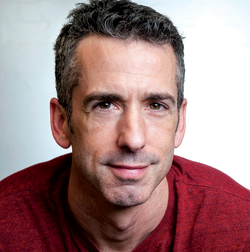By: Chris Azzopardi*/Special for TRT–
In his two-decade career as a sex-advice columnist, and more recently as creator of the It Gets Better Project, Dan Savage has entertained readers with his frankness and inspired queer kids with his encouragement – even when some people would rather he just go away. Those same people – critics who have called him racist, transphobic, the devil and even The Gay Fred Phelps – are the ones he takes on in our recent interview.
Chris Azzopardi: How does it feel going from cheeky columnist to a leader in the LGBT movement after launching the It Gets Better Project?
Dan Savage: (Laughs) I don’t know! I never describe myself as a spokesman or having any sort of role in the movement – because it pisses off people who probably should be pissed off, or probably just want to be pissed off. I’m just a writer. Usually when people start talking about a gay writer in relation to their role in the movement, what comes next is they want you to shut up.
Q. It’s true. There are a lot of conservatives who wish you’d shut your mouth.
A. There are a lot of lefties out there who are trying to get me to shut up! There are lefty queers who think that I’m the devil.
Q. The people who hate you, especially in the gay community, say that although you created the It Gets Better Project to curb bullying, you are a bully yourself – that you bully the obese, Republicans and Christians. How do you respond to people who call you hypocritical?
A. Well, usually they’re lying or they’re full of it, or they’re confused about what bullying is. Bullying is a power relationship; it’s about the powerful picking on the weak and the vulnerable and the persecuted. That I have an opinion about the obesity epidemic that you disagree with doesn’t make me a bully. That I write a column where people are allowed to use the language that they actually use when they talk about their sex lives, and that I use the word “fag” in my column, doesn’t make me a bully.
Rick Santorum says I’ve bullied him – because he is somehow the moral equivalent of a vulnerable and isolated closeted gay 13-year-old growing up in Texas who has no support and nowhere to turn? That’s Rick Santorum? This is dumbing bullying down to mean absolutely everything.
People who claim that they’ve been bullied by me or my column are full of $#&t. (Laughs) Now they’ll claim that that is bullying because I’m supposed to go, “Oh, golly gosh, you just threw the word ‘bullying’ on the table and it’s kryptonite and I must melt in the face of it.” Somebody disagreeing with you – that ain’t f#@$%&g bullying.
Q. How about telling Republicans to kill themselves? What’s that?
A. (Laughs) I actually haven’t ever told a Republican that they should kill themselves, and the one time on Bill Maher I said under my breath, “I wish they were all dead,” I immediately apologized before anybody barked at me about it. It was the wrong thing to say, and I apologized before anybody yelled at me. I didn’t wait for there to be a scandal to apologize. You know, when you run your mouth for a living, sometimes you run yourself into a ditch. It’s important at those moments to man-up and say, “Hey, that was wrong.”
People try to claim that I’m a bully – and it’s bull$#&t. It’s actually a form of bullying, you know, when queers show up and somebody throws a jar at your face and dumps glitter on you and says that you’re an anti-trans bigot. To accuse somebody in the hothouse environment of queer activism of being an anti-queer bigot is bullying, especially when you’ve got nothing to back it up.
Q. Where does this hatred come from? How did you become this “bully” within the gay community?
A. What that comes from is that some f#@$%&g queer people are crazy. That’s where that comes from! (Laughs) I’m for trans-inclusion. I keep pointing out that the Don’t Ask, Don’t Tell repeal is not finished because trans people are banned from serving in the military, and I raised $5,000 for a trans woman’s funeral on my blog in 2004. Buck Angel and Kate Bornstein have been guest sexperts. Find me a sex-advice columnist who was seeking out the opinions of high-profile trans people 15 years ago and lending them their platform. If that amounts to anti-trans bigotry, if I’m the enemy in the trans community, then the trans community could use more enemies like me.
The It Gets Better Project wasn’t the S#@k My D&@k, I’m Dan Savage Project. (My partner) Terry (Miller) and I got it rolling and then stepped out of the way. And a lot of trans people made videos. Some of the first videos that came in were from trans people and upped the visibility of trans people. I’m the executive producer of the two It Gets Better specials that we did for MTV, which reached millions and millions of people. One of the six stories we told was Aydian’s – who’s trans! What’s funny is that anything I do that is vaguely in-line with stuff that I’ve always done that’s pro-trans is now, “He’s just covering up for his transphobia by being pro-trans.”
Q. What do trans people point to? Why do some of them think you hate them?
A. That I’ve used the word “tranny” and the word “she-male” in my column. I stopped using them after people raised objections, but people still cite columns I wrote 10 years ago. I think we all know more about trans issues than we did 20 years ago. I have trans friends who actually think we should use the term “she-male” when we’re referring to a type of trans woman who does escorting or a particular porn genre, because what other term is there? What are you supposed to say when you mean she-male porn?
Q. You also use “fag,” so that must make you anti-gay.
A. And I use “breeder,” so I’m anti-straight. We could pick this apart. I’m a rape apologist. I’m racist. It’s kind of hilarious. (Laughs)
Q. The It Gets Better Project has become a worldwide movement. Did you anticipate it taking off like it has?
A. No, absolutely not. When I announced it, I thought it would be this cool project for my readers. We hoped that we would get about 100 videos, because I felt like if we got 100 videos, we’d get some of everybody. Terry and I were both aware when we released that first video that not all queer people look like us, have penises like the both of us happen to, want the same things out of life – and it would only be meaningful if there was a lot of everybody, a lot of different kinds of queer people.
We got 100 videos in probably 12 or 24 hours, and it kind of blew us away. That just this week It Gets Better launched in Portugal and Italy, and there are It Gets Better Projects in Latin America, Australia, the United Kingdom and Sweden – it’s kind of amazing. There’s probably 80,000 videos, and millions of people have taken part in the projects.
It became part of a sensation, and then celebrities and politicians started jumping in; we did not solicit videos from celebrities and politicians. The ones that are really valuable to everyday ordinary queer kids are the everyday ordinary queer people who you haven’t heard of. We don’t want to say that to be happy and loved you have to be Ellen, because not everybody gets to be Ellen.
Q. Some of your critics thought that It Gets Better was too passive, that we should tell kids to fight back. Scott Thompson of The Kids in the Hall told me his advice to kids would be to “grow a pair.”
A. (Laughs) You know what, that’s what some people said in the videos. One of our favorite videos was from Gabrielle Rivera, this Latina lesbian poet in the Bronx who made this video that some people thought we would hate. In her video she’s like, “I’m here to tell you that it doesn’t get better. These white people and their money, and they can sit in their nice apartments.” But she was like, “F#@k that and these people. I’m here to tell you it does not get better; I’m here to tell you, you get stronger.” That’s grow a pair – or you will have a pair grown for you. (Laughs)
Most of the misconceptions people have of what’s in the videos can be cured if they spend five minutes watching them. If you watch them, what you see are people talking about how they made it better themselves, what they did, how they demanded better of their families and their communities. It didn’t just happen to them – the sun didn’t just come up and it was better one day. So there’s nothing passive about the project.
Q. Who told you it gets better when you were a kid?
A. People have asked me, “Would you have liked there to be an It Gets Better Project for you?” and I’ve always said that there was. When I was 13 years old in 1977, growing up in Chicago, I remember very distinctly being out at the movies with my mother, siblings and dad – and there were two gay guys in line holding hands in front of us. My parents were kind of unhappy and freaked out, and I just remember looking at the couple and going, “I always knew I was different. Now I know how.” I just looked at them and thought, “They look happy; I’ll be OK.” And they were telling a story, which is what the project is about.
Fifty years ago, you used to think you were the only queer person in the world. You didn’t think there was another boy like you. Queer kids don’t grow up with that kind of isolation anymore. But there are bullied queer kids out there who know there are happy queer adults in the world, but they don’t know how you get to be one. But so many of us suffered, and then we got past it.
With this project, we were able to share those stories. And there have been other suicides since that have been earth-shattering, particularly Jamey Rodemeyer’s suicide. We’ve heard from thousands of kids – and some parents, even. And nobody writes about the kids who didn’t kill themselves. It’s not a news story when a gay kid doesn’t kill him- or herself.
Q. Who do you go to for advice?
A. I used to go to my mom, but my mom passed away, so I go to my brother Billy. He gives great advice. He’s a smart dude.
Q. Does Terry give you good advice?
A. (Laughs) Well … Terry and I are spouses; we talk about everything. Terry is a very smart person, but usually when I need advice it’s about Terry, so I can’t really go to Terry.
Q. What are some trends in gay sex? Have dental dams caught on yet?
A. No – dental dams for [oral intimate acts] didn’t catch on during the worst of the AIDS epidemic; they’re certainly not catching on now. Trends in sex: Well, kink has gone completely mainstream. I’d like to think that my column sort of opened the discussion of kink and helped make it more mainstream. Look at Fifty Shades of Grey now. Back when, people who had the audacity to hang Robert Mapplethorpe pictures in museums were put on trial; newspapers and courts talked about S&M as if it were the most depraved and disgusting thing that a human being could possibly do next to gay sex. And if you did it in addition to gay sex or at the same time, oh my god – you were Satan. Now it’s pretty mainstream. But that’s human sexuality.
Gay sex always had at its heart that sex is about pleasure and intimacy and not about reproduction – and it’s not about reproduction for straight people either, but they like to pretend that it is. Straight people have a lot more sex than they have babies.
Q. For someone who gives advice on sex, you must have a pretty fulfilling, or at least entertaining, sex life. How much of the advice you give is based on your own sex life?
A. Gay people tend to know more about sex and be better at it than straight people, because sex is what makes us not straight people so we think about it more. So everything I write about – not everything; I haven’t salined my b@!!s. Not yet, anyway. The night is young. Who knows what could happen. But I take a healthy interest in variance and difference. I’m always kind of curious about what people are up to. We have, I think, a pretty awesome sex life, and it’s adventurous and we’ve been together a long time and everything is still pretty … great. (Laughs)
Q. There were about four other adjectives in there.
A. There were! Some people are shocked when they come over to our house and they expect that there will be a sling over the dining room table, and there isn’t. It’s very Ozzie and Harriet around here. We kind of have a grandma house. It’s very boring. Not that we don’t have a sling; we do – it’s just not hanging over the dining room table.
*Chris Azzopardi is the editor of Q Syndicate, the international LGBT wire service. Reach him via his website at www.chris-azzopardi.com.








